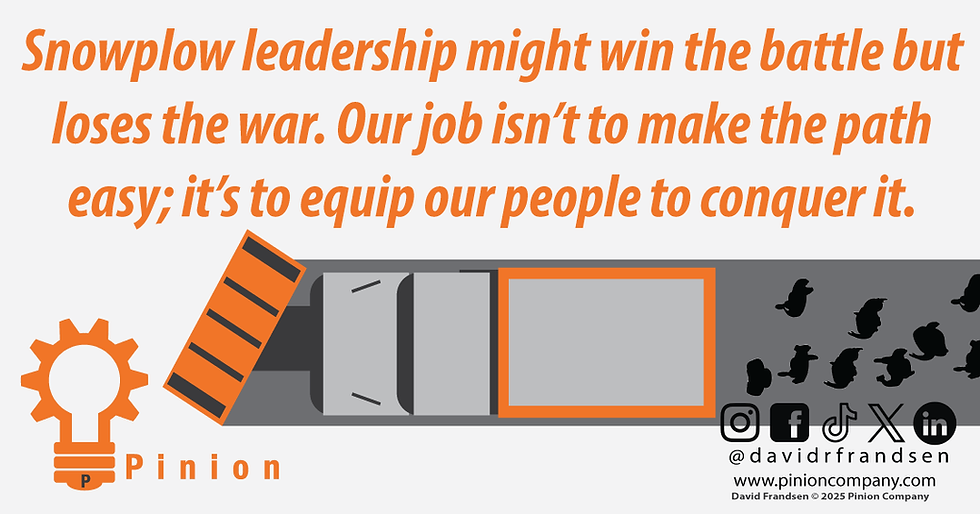Rethinking Legacy: Writing Your Retirement Obituary
- David Frandsen
- Aug 21, 2025
- 3 min read

The well-known exercise of writing your own obituary, popularized by self-help experts and
career coaches, asks you to clarify your legacy—what do you want people to remember when you’re gone? Recently, I started reimagining this question for a milestone that’s nearer but equally meaningful: what will someone say about you at your retirement party?
From Obituary to Retirement Speech
This idea sparked an honest conversation with my leadership team. After attending numerous retirement celebrations, I’ve noticed that speeches often sound generic, with a person’s whole career reduced to polite bullet points. In those moments, I’ve wondered: could someone share something more personal and sincere about me when I retire? This prompted a harder, more personal question—what would I say about my own work when that time comes?
Retirement parties aren’t just rituals; they’re mirrors. They reflect both how others experienced your contributions and how you view your own journey. Job titles and years of service matter, but what truly stands out are authentic moments when you brought your best self to work and made a real impact. As I look ahead to the close of my 30+ year career, I want my story to be more than a list of achievements; I want it to be a narrative woven with purpose and legacy.
Making the Exercise Actionable
To move from reflection to meaningful change, use the “retirement obituary” as a tool for career alignment. Here are key prompts and strategies to turn this thought experiment into a practical, motivating career guide.
Imagine Three Speeches
Think about three types of people who might speak at your retirement:
· A trusted colleague: What would they share about your teamwork and support?
· Someone you mentored: What impact did you have on their growth or mindset?
· Your own voice: What are your proudest personal achievements and moments of meaningful contribution?
Crafting these imagined speeches helps clarify the legacy you’re actively creating, from the influence you leave on peers to the personal milestones that made your career meaningful.
Highlight Defining Moments
Consider the stories that defined your journey—times you solved tough problems, stood up for your beliefs, or made a difference for others. Small moments can loom largest: a quick conversation that inspired a colleague, or a pivotal decision that shaped your team’s culture. Ask yourself: When did you embody the qualities you hope to be remembered for?
Identify Core Values
Identify the three values you most want people to associate with your name. Have you consistently acted on them in daily decisions? Your legacy is built on values lived out, not just spoken aloud.
Consider Your Shadow Legacy
Ask: What habits, phrases, or attitudes have others adopted because of your example? Sometimes your most enduring legacy is woven into the daily lives of people you’ve influenced, often in ways you may not realize.
Project Your Impact Forward
Imagine the one thing someone might say at your retirement that would make you feel proudest. What can you do today to make that future statement possible? Translate that aspiration into concrete, daily actions.
Set “Legacy Goals” and Track Progress
Establish goals around mentorship, team culture, or organizational improvement. Track your progress on these as you would with any professional metric. Celebrate advances, learn from setbacks, and regularly recalibrate.
From Reflection to Daily Practice
Reflection is only the first step; intentional, everyday action is where your legacy takes shape. Pay attention to the feedback and chance remarks that energize you—these often point to where your biggest opportunities for impact lie. In my own journey, a passing comment about my “management style” led me to consciously define and share my philosophy, turning it into a replicable framework for others.
These frameworks serve as your compass, guiding you toward choices that align with the legacy you wish to leave. Break broad intentions into specific, measurable steps—such as mentoring a colleague, leading a project, or creating a knowledge resource. Set timelines, iterate, and make feedback a habit.
Share your progress and insights with trusted peers. This not only nurtures accountability but also strengthens the collective legacy of your organization in real time. By regularly revisiting your intentions and tracking your actions, you ensure your story remains vibrant, evolving, and authentically yours.
Living With Legacy in Mind
This exercise isn’t just about preparing for a retirement celebration—it’s about living each day with purpose. Asking, “What do I want people to say?” can become a powerful compass, shaping your leadership, relationships, and contributions now.
Move from reflection to action. Design a legacy worth celebrating—one built not on chance or routine, but on daily choices that make your story matter, to you and to those you lead.
#RetirementObituary #GearUpForSuccess #GearUp #GearUpYourOrganization #LeadershipDevelopment #Leadership #LeadershipSkills #LeadershipTraining #ProfessionalDevelopment #LeadershipCoaching #PersonalGrowth #CareerDevelopment #LeadershipQuotes #LeadershipGoals #Coaching #Entrepreneurship #Mindset, #Success #PersonalDevelopment #BusinessStrategy #ProfessionalGrowth #LeadershipMatters #LeadershipLessons #Empowerment




Comments